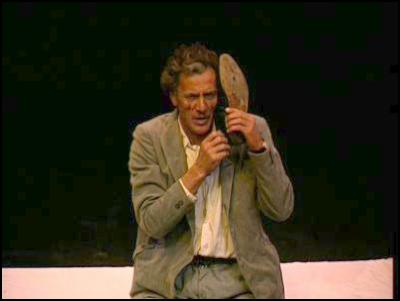Nettnin Film Review: Since You've Been Gone
Film Review: Since You've Been Gone
By Sonia Nettnin At The Chicago Palestine Film Festival

The multitalented actor and
director, Mohammad Bakri incorporates his acting career and
personal life in his latest film, 'Since You've Been Gone.'
Bakri chronicles the violence against Palestinians and
Israelis since the death of his dear friend, the late Emil
Shukri Habibi (1921 - 1996). (Photo courtesy of CPFF)
"Since You've Been Gone" is the autobiographical documentary of actor and director Mohammad Bakri. He focuses on the violence inflicted on Palestinians and Israelis in recent years -- caused by Israeli occupation and oppression. Bakri incorporates his tumultuous media life in Israel.
After the death of his dear friend and mentor, the late Israeli-Arabi writer and politican, Emil Shukri Habibi (1921-1996), Bakri visit Habibi's grave site. He shares what has happened in his life and the lives of Palestinians and Israelis since his friend's death.
Through archival news clips and personal video footage Bakri employs flashbacks of chaotic events within Israel and the West Bank -- beginning with September 28, 2000. On this day, a former Israeli parliament member at the time, Ariel Sharon, surrounded by dozens of Israeli police officers, Shin Bet security and Israeli Army soldiers walked the esplanades of the Temple Mount, which contains the Al Aqsa Mosque.
Bakri uses archival news footage of what Sharon said and of East Jersualem in an uproar. The military assault against the angry Palestinian population resulted in the loss of 13 youths. Soon after, the violence extended into the West Bank, which looked like a war zone. Footage shows Israeli helicopters dropping bombs on the Palestinians, who ran in all directions. People carried bloody bodies and one clip shows one man shot to the ground after he threw a rock.
Within the Or Committee's investigative dossier one of their conclusions was that the Arab public should "...avoid incitement against the state and its institutions." Israeli leadership should heed its own advice. As committee members read their conclusions, bereaved Palestinian mothers sat in the conference room holding photos of their dead sons.
Bakri's collective montage is a triple framework: when Habibi was alive, he responded to the Israeli-Palestinian conflict through politics, black humor and satire in his writing. He believed in the Haifa model of peaceful coexistence. Yet, Bakri wonders how Habibi would have responded if he was alive to experience the drastic geopoitical changes and socioeconomic conditions endured by Palestinians today. Finally, Bakri takes us on a cinematic jourmey of his personal course of actions. When his nephews participated in the logistics of a suicide mission that killed nine Israelis and injured 40 people at the Meiron Junction, how did Bakri respond to the public? The two-edged effect of the similiarities and the differences between these two men, who are from different generations living in different times with diverse life situations, is effective. The escalated violence in the region, such as the wall and the increased number of checkpoints has given life to forms of violence that affect whether or not there is food on peoples' tables. Then again people may not have a table after their homes have been demolished. Bakri shows viewers an Israeli home demolition in his birth village of Ban'a. Bakri brings clarity to the tragedies that result from verbal, psychological and physical violence experienced by Israelis and Palestinians.
Although Bakri gives substantial airtime to three Palestinian suicide bombings and his thoughts about these heinous crimes, he presents the side of the conflict - the violence and war crimes inflicted upon the Palestinian population - that Americans do not see in US news. This footage will shock some Americans who have not seen these events before.
When Bakri filmed the 2002 Israeli invasion of Jenin, Operation Defensive Shield, for his documentary "Jenin, Jenin," his overarching objective was to inform the Israeli public about the crimes committed in the Occupied Territories. "I wanted to be a person that proves how much he cares around here," Bakri adds.
However, far-right, Israeli extremists expended an exorbitant amount of time and energy expressing their hatred of Bakri in public and in front of the cameras. The Israeli Film Rating Board banned his film. Then a group of Bakri's supporters petitioned the Israeli High Court, who overturned the censorship. During the film's initial premiere, several Israelis protested inside and outside of the theater.
On the other hand, there are many Israelis who respect Bakri's work, which demonstrates there is a diverse, Israeli public receptive to new information and the Palestinian perspective. These relations can be seen when Bakri and his son walk the streets and sell copies of "Jenin, Jenin."
Bakri fleshes out the aesthetic in the scenes where he visits Habibi's grave site. The close-ups of Bakri's worn face against the stark, gloomy sky enhance his melancholy reflections. Even though Bakri claims he is like a character he once played named Jabber (whose name means "fearless"), Bakri shares his fears and despair. Although he does not speak there is monologue of his intimate, mind-thoughts, which brings his feelings to the forefront of his listeners.
"Those that I have loved have gone, and I have remained alone, like a lonely sword. How I hate death, Abu Salaam," Bakri says. He shares these retrospective statements and explained that Habibi said these words when he reminisced about people after they passed away. This understanding makes Bakri's confession poignant.
Even though Habibi is gone, Bakri, amid the media chaos with his family, found true and lasting friendship with his attorney, Avigdor Feldman, the son of Holocaust survivors. Feldman's life story reveals the pain Israelis experience within their families. Together, Bakri and Feldman symbolize how relations can be between Israelis and Palestinians.
Overall the transitions between time periods with the video and news footage are smooth. Clips of Bakri's past performances, including the character, Said al Nahas al Mishtaal, the pessimistic optimist / optimistic pessimist in the one-man play, "Opsimist" (Al Moutachael) based on Habibi's 1984 novel, anchored the shift in news and his personal life events. Even though Bakri admires Habibi, Bakri is his own artist and this film adds to his award-winning work. Bakri's films have appeal for Western audiences.
How someone could endure such media pressures, stranger hatred, government attacks, and enough slander from all for a string of potential lawsuits is mind-boggling. Yet, I do not think Bakri was looking for sympathy for himself, but understanding and security for both peoples.
Despite the black hole that has developed in the Holy Land, the paradox sometimes found in hope may bring the resilient hope that arises from despondent anticipation.
-This film (in Arabic and Hebrew with English subtitles) will be showing at the Gene Siskel Center, located at 164 N. State St. for the 5th Annual Chicago Palestine Film Festival on Saturday, May 20 at 3:15 P.M. and Tuesday, May 23 at 6 P.M.
Photography Faysal Hassairi
Sound Recording Jerard Alush; Misha Specter; Ofer Amzaleg; Neme
Zaknoon
Music Amir Shahsar; Habib Shhadeh
Head Musician Nsim Dakwar - Violin and Violas
Vocals Yafa Bakri
Film and Video Archives
Sound Editor and Mix Yuval Barazani
Poster Designed by Irena Karkabi
Arabic Calligraphy Rihan Titi
Hebrew Translator Rami Livneh
English Translator Yael Barda
Arabic Translator Tamer Salman
Inital Editing Iyas Salman
On-Line Editor Roee Leron
Script Development Funding Israel Film Fund
The New Israeli Foundation for Cinema and T.V.
Produced in Association with - Sikkuy-Or Watch
Editor Gabi Shihor
Producers Avi Kleinberger; Mohammad Bakri
Written and Directed by Mohammad Bakri
Duration: 52 minutes
2005
U.S. journalist and film critic Sonia Nettnin
writes about social, political, economic, and cultural
issues. Her focus is the Middle
East.


 Ramzy Baroud: Civil War On The Horizon? The Ashkenazi-Sephardic Conflict And Israel’s Future
Ramzy Baroud: Civil War On The Horizon? The Ashkenazi-Sephardic Conflict And Israel’s Future Gordon Campbell: On The Government’s Latest Ferries Scam
Gordon Campbell: On The Government’s Latest Ferries Scam Peter Dunne: Dunne's Weekly - While We're Breaking Up Monoliths, What About MBIE?
Peter Dunne: Dunne's Weekly - While We're Breaking Up Monoliths, What About MBIE? Adrian Maidment: Supermarket Signs
Adrian Maidment: Supermarket Signs Ian Powell: Revisiting Universalism
Ian Powell: Revisiting Universalism Martin LeFevre - Meditations: In A Global Society, There Is No Such Thing As “National Security”
Martin LeFevre - Meditations: In A Global Society, There Is No Such Thing As “National Security”